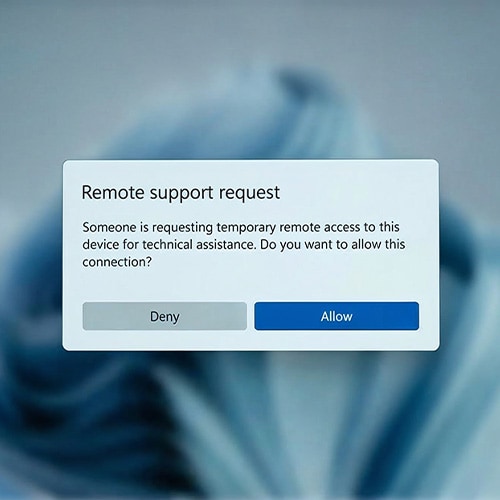You must visit your state DMV in person to get a REAL ID — you can’t apply online or through the mail.
A REAL ID is a specific type of driver’s license or state-issued ID that meets federal security standards, and you'll need one if you intend to fly. However, what’s supposed to be a straightforward trip to the Department of Motor Vehicles has become a gold mine for fraudsters taking advantage of confusion, delays, and misinformation.
In areas like New Jersey and Pennsylvania, REAL ID fraud is surging since many are running to get their ID, as reported by 6ABC. And The Washington Times reported a similar increase in activity targeting seniors and immigrants in particular — people who might be less familiar with how REAL ID works or who may face language barriers.
If you’ve gotten a suspicious text or seen an ad offering to “fast-track” your REAL ID, take a breath and keep reading. This post breaks down how REAL ID text scams work, how to spot them, and what to do if you’ve already been tricked.
How REAL ID scams work
REAL ID scams work because many feel the urgency to get it since it’s needed to travel within the U.S. Here’s the usual scenario that’s been popping up across the U.S. and local news reports:
You get a text that says there’s a problem with your REAL ID application. There’s a link to fix it. Maybe it even says it’s from the DMV. Perhaps it’s from a service claiming they can help expedite your REAL ID. You click it.
Then, the link takes you to a webpage asking for your name, Social Security number, and driver’s license information. You fill it out, hit submit, and don’t think twice — until you get an alert about a new credit card you didn’t open.
Sound far-fetched? It’s not.
According to the Federal Trade Commission, these ID scams have been flooding inboxes since the deadline passed. Some scammers have even created fake websites similar to state DMV portals.
How to protect yourself against Real ID scams
You can help protect yourself from a REAL ID scam if you know what warning signs to look for. Also, you don’t need a REAL ID to fly if you have a valid U.S. passport, so there’s no need to panic if you’re short on time.
But if you are planning to get one, stick to the basics:
- Visit your DMV in person. This is the only legitimate way to get a REAL ID. Anyone offering to help you get one online or by phone is incorrect.
- Don’t click links in texts or emails. Scammers often mimic official messages. If you receive a “REAL ID notification,” go to your DMV’s official site directly instead of clicking.
- Verify claims with the DMV. If you get a suspicious message, contact your state DMV and confirm whether it's real. Most states have scam alert pages to help you double-check.
Never share personal information. Real government agencies won’t ask for your Social Security number or ID over SMS or email.
What to do if you fall victim
If you’ve already shared your personal information, don’t panic — but don’t wait either. Scammers can use your info to open accounts, file fraudulent tax returns, or worse. Here’s how to fight back:
- Report the scam. File a report with the FTC and let your state’s DMV know what happened.
- Place a fraud alert. Contact the three major credit bureaus — Equifax®, Experian®, or TransUnion®.
- Consider freezing your credit. This makes it harder for anyone to open new accounts in your name.
- Monitor your credit and identity. Use a service like LifeLock Standard to track unusual activity, get alerts, and access recovery support.
Identity threats are real — protect yours now
REAL ID is meant to make travel and access more secure. Ironically, it’s become a new entry point for identity theft. If you’re not already taking steps to protect your personal information, now is the time. Use trusted tools to help protect your personal information and stay safe.
Editor’s note: Our articles provide educational information. LifeLock offerings may not cover or protect against every type of crime, fraud, or threat we write about.
Start your protection,
enroll in minutes.
LifeLock is part of Gen – a global company with a family of trusted brands.
Copyright © 2026 Gen Digital Inc. All rights reserved. Gen trademarks or registered trademarks are property of Gen Digital Inc. or its affiliates. Firefox is a trademark of Mozilla Foundation. Android, Google Chrome, Google Play and the Google Play logo are trademarks of Google, LLC. Mac, iPhone, iPad, Apple and the Apple logo are trademarks of Apple Inc., registered in the U.S. and other countries. App Store is a service mark of Apple Inc. Alexa and all related logos are trademarks of Amazon.com, Inc. or its affiliates. Microsoft and the Window logo are trademarks of Microsoft Corporation in the U.S. and other countries. The Android robot is reproduced or modified from work created and shared by Google and used according to terms described in the Creative Commons 3.0 Attribution License. Other names may be trademarks of their respective owners.





